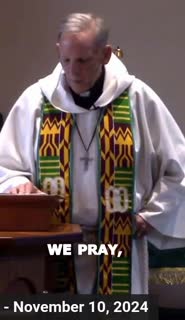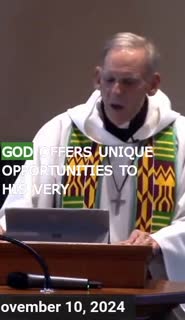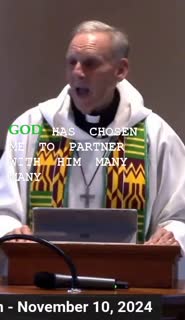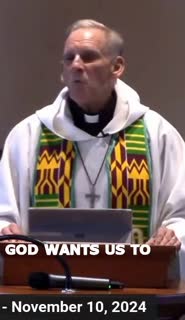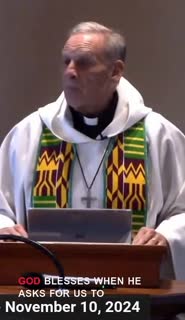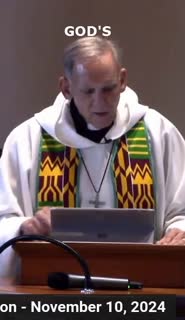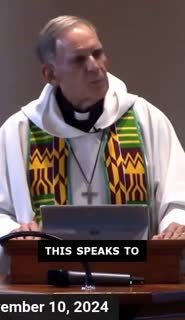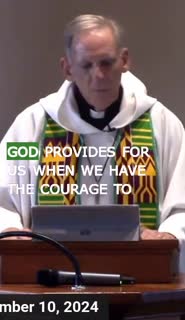Embracing Sacrifice: Trusting God's Provision and Purpose
Devotional
Sermon Summary
Bible Study Guide
Sermon Clips
We pray, Father, for our search committee as we look for our next senior pastor, and we pray that you would be with them and guide them, and that, Holy Spirit, we know that you have a plan and a purpose, and we pray that you would reveal that to us. We pray for our leaders here at TMAC, and we also pray for our leaders spiritually, for Bishop Alex, for Archbishop Steve. [00:11:08] (30 seconds)
And now, Holy Father, we invite you to pour out your Holy Spirit upon us. Help us, Father, to hear your voice, to know your heart, to hear you, Lord, and have the courage to obey you so that we might live that life that you have bought for us through the death of Jesus Christ. Come, Holy Spirit, fill us with your presence. Fill this place with your glory. [00:12:28] (23 seconds)
This morning in Sunday School we talked about a book a famous book that was written by C .S. Lewis it's entitled Screwtape Letters it's a series of letters that were was written from supposedly from a upper level demon by the name of Screwtape to his protege Wormwood who has a young believer as his patient or his charge and Screwtape is advising Wormwood on how to sidetrack the patient to keep them from becoming a fully devoted follower of Christ. [00:29:10] (39 seconds)
God likes to put pressure on us so that our faith is refined have you discovered that that God puts us in the valleys because God is refining us and he's refining us in fire difficult times when we're refined we're able to be used by God for greater good and we're able to be blessed in far greater ways it's sort of like the sign you see in gymnasiums the slogan no pain no gain that's the way the Christian life works. [00:30:50] (38 seconds)
God offers unique opportunities to his very special children. In other words, God doesn't really give cattle calls where just anybody can apply. When God approaches us, he approaches us uniquely, individually. He touches our hearts specifically. God selects uniquely chosen people to invest in the work of God. [00:36:23] (30 seconds)
God has chosen me to partner with him many, many times throughout my life. Sometimes I've missed it. But the times where I've yielded and allow God to use me for whatever he has on the stove, whenever he's cooked up, it's been a time of enormous blessing. But God's picky, and we need to recognize the honor of being called by god and we need to grab our chance when the opportunity presents itself to partner with god. [00:37:47] (32 seconds)
God wants us to know that he is a good and kind and loving god of grace and what we get from god we can't possibly earn grace is god's favor that we get without any merit from us without doing anything to earn it we don't want to suffer we want success we don't identify with those who are low and hurting those who are high and healthy we don't like losers we like winners. [00:42:02] (35 seconds)
God blesses when he asks for us to sacrifice. It seems that God treats believers like a rubber band. They are made to stretch. When a rubber band is not being stretched, it's small and relaxed, but as long as it remains relaxed, it's not doing what it was created to do. When it stretches, it gets bigger, larger. It becomes tense. It's dynamic. [00:43:16] (29 seconds)
God's plan begins with offering us unique opportunities to participate in what he's doing. We ought to get excited about God's demands on our time and our talent and our resources, because God has counted us worthy, and he's saved us for a long time. He's saved us for a long time. He's saved us for a long time. sought us out individually, specifically to partner with him, but God's opportunities will almost always contain risks, challenges. [00:43:45] (28 seconds)
This speaks to the fact that God does not need us to accomplish his purposes. Have you figured that out? When God calls us to sacrifice, it's not because God is desperate and we need to help him out of a mess. God doesn't need to use you. He has honored you by giving you the power to do so. By calling you to sacrifice in order that you can get rid of the things that have become an obstacle between you and God so that he can bless you immeasurably and use you for his greatest glory. [00:51:47] (39 seconds)
God provides for us when we have the courage to put him first. Verse 14. of Israel says there will always be plenty of flour and oil left in your container until the time when the Lord sends rain and the crops grow again. Jesus spoke of this Old Testament story in Luke 4 .25. Jesus said certainly there were many widows in Israel who needed help in Elijah's time when there was no rain for three and a half years and hunger stalked the land and yet Elijah was not sent to any of them. [00:55:50] (39 seconds)
Ask a question about this sermon
And now, Holy Father, we invite you to pour out your Holy Spirit upon us. Help us, Father, to hear your voice, to know your heart, to hear you, Lord, and have the courage to obey you so that we might live that life that you have bought for us through the death of Jesus Christ. Come, Holy Spirit, fill us with your presence. Fill this place with your glory. [00:12:28] (23 seconds)
This morning in Sunday School we talked about a book a famous book that was written by C .S. Lewis it's entitled Screwtape Letters it's a series of letters that were was written from supposedly from a upper level demon by the name of Screwtape to his protege Wormwood who has a young believer as his patient or his charge and Screwtape is advising Wormwood on how to sidetrack the patient to keep them from becoming a fully devoted follower of Christ. [00:29:10] (39 seconds)
God likes to put pressure on us so that our faith is refined have you discovered that that God puts us in the valleys because God is refining us and he's refining us in fire difficult times when we're refined we're able to be used by God for greater good and we're able to be blessed in far greater ways it's sort of like the sign you see in gymnasiums the slogan no pain no gain that's the way the Christian life works. [00:30:50] (38 seconds)
God offers unique opportunities to his very special children. In other words, God doesn't really give cattle calls where just anybody can apply. When God approaches us, he approaches us uniquely, individually. He touches our hearts specifically. God selects uniquely chosen people to invest in the work of God. [00:36:23] (30 seconds)
God has chosen me to partner with him many, many times throughout my life. Sometimes I've missed it. But the times where I've yielded and allow God to use me for whatever he has on the stove, whenever he's cooked up, it's been a time of enormous blessing. But God's picky, and we need to recognize the honor of being called by god and we need to grab our chance when the opportunity presents itself to partner with god. [00:37:47] (32 seconds)
God wants us to know that he is a good and kind and loving god of grace and what we get from god we can't possibly earn grace is god's favor that we get without any merit from us without doing anything to earn it we don't want to suffer we want success we don't identify with those who are low and hurting those who are high and healthy we don't like losers we like winners. [00:42:02] (35 seconds)
God blesses when he asks for us to sacrifice. It seems that God treats believers like a rubber band. They are made to stretch. When a rubber band is not being stretched, it's small and relaxed, but as long as it remains relaxed, it's not doing what it was created to do. When it stretches, it gets bigger, larger. It becomes tense. It's dynamic. [00:43:16] (29 seconds)
God's plan begins with offering us unique opportunities to participate in what he's doing. We ought to get excited about God's demands on our time and our talent and our resources, because God has counted us worthy, and he's saved us for a long time. He's saved us for a long time. He's saved us for a long time. sought us out individually, specifically to partner with him, but God's opportunities will almost always contain risks, challenges. [00:43:45] (28 seconds)
This speaks to the fact that God does not need us to accomplish his purposes. Have you figured that out? When God calls us to sacrifice, it's not because God is desperate and we need to help him out of a mess. God doesn't need to use you. He has honored you by giving you the power to do so. By calling you to sacrifice in order that you can get rid of the things that have become an obstacle between you and God so that he can bless you immeasurably and use you for his greatest glory. [00:51:47] (39 seconds)
God provides for us when we have the courage to put him first. Verse 14. of Israel says there will always be plenty of flour and oil left in your container until the time when the Lord sends rain and the crops grow again. Jesus spoke of this Old Testament story in Luke 4 .25. Jesus said certainly there were many widows in Israel who needed help in Elijah's time when there was no rain for three and a half years and hunger stalked the land and yet Elijah was not sent to any of them. [00:55:50] (39 seconds)
